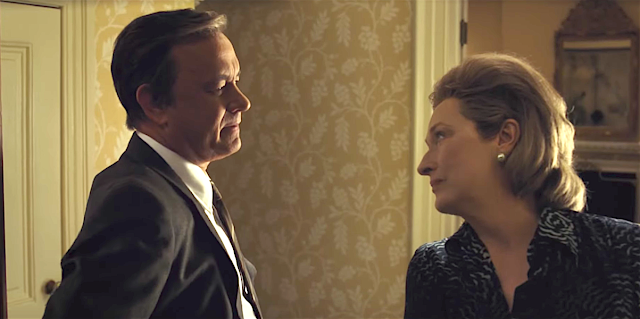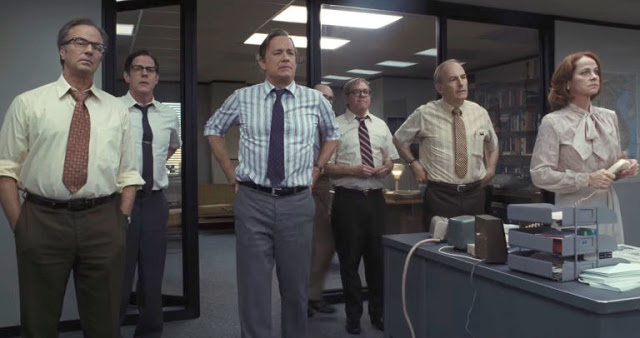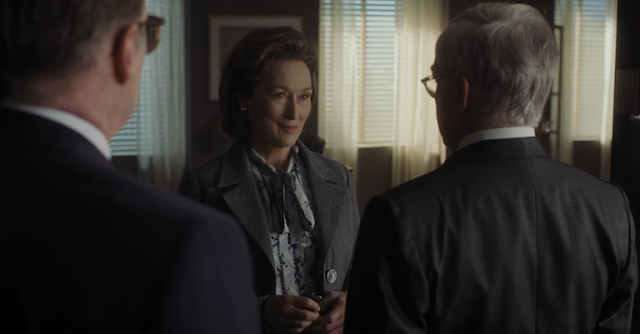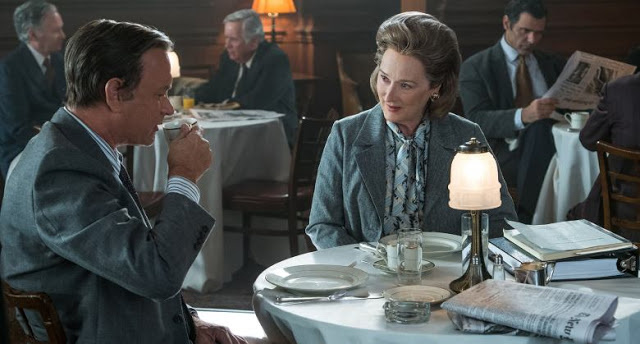Describe The Post in terms of its plot, and you risk making it sound like a bore. Here is a based-in-fact film about a band of huffy journalists who squabble with a cadre of wussy pencil-pushers about whether to publish a newspaper article; these are not typically the raw materials of exciting drama. Yet because we currently live in a society where the government openly wages war on the press, The Post is one of the most important political movies of our time. And because it has been directed by Steven Spielberg, it is also one of our most enjoyable.
In recognizing the former, one should be careful not to ignore the latter. The unnerving topicality of The Post threatens to overshadow just how effortlessly it works as a piece of cinema, how sharply crafted and exquisitely performed it is. Employing his characteristic care and vigor, Spielberg has almost imperceptibly transformed the film’s bustling narrative—a thicket of murky backroom meetings, lavish dinner parties, and complex legal proceedings—into a rousing and supremely entertaining production. Contemporary circumstances may have rendered The Post regrettably relevant, but this movie would be a delight to watch regardless of who’s sitting in the Oval Office.
Following an unnecessary prologue set in Vietnam, the film takes place primarily in 1971, when the death toll in Southeast Asia kept climbing and the stateside protests kept erupting. It’s a perpetual political tempest, but when we first visit the offices of the Washington Post, lorded over by prickly editor-in-chief Ben Bradlee (Tom Hanks), we aren’t treated to a spectacle of brilliant reporters frantically filing stories that shaped the course of history. Instead, rather than investigating the White House for corruption, Bradlee and his subordinates—including Ben Bagdikian (Bob Odenkirk) and Meg Greenfield (Carrie Coon)—are debating how best to cover Tricia Nixon’s wedding. That isn’t exactly the stuff of world-altering headlines, and the paper’s relative triviality is only reinforced when the New York Times publishes an exposé detailing how Nixon’s White House, along with those of Johnson, Kennedy, and even Eisenhower, have been systematically deceiving the American public about the country’s prospects in Vietnam for decades. Watching Bradlee’s face turn into a scowl, it’s hard to tell what displeases him more: the facts of the story itself, or that they were reported by a rival paper.
That spirit of healthy journalistic competition—the relentless pursuit of the scoop—is one of the forces driving The Post, a movie which, like Spotlight and All the President’s Men before it, derives its energy from the vicarious thrill of watching people hard at work. News reporting isn’t exactly a glamorous business, and Spielberg doesn’t feel obligated to sex up an occupation whose duties involve making unanswered phone calls and combing through reams of printouts. Yet there’s nevertheless an exhilarating charge to the way he stages the Post’s operations, his camera smoothly snaking its way through the newsroom as Bradlee and his staff collaborate, challenge, and bicker. The script, by Liz Hannah and Josh Singer (the latter a co-writer of Spotlight), hums with intelligence and humor—when an underling tells Bradlee that he can finish a story in two days, the seasoned editor responds, “What if we pretend you’re a reporter and not a novelist?”—and it delves into the industry’s nitty-gritty without ever feeling artificial or jargony.
Were it exclusively about reporters hunting a game-changing story, The Post would still be robust and compelling. But there is much more going on here, a network of interrelated developments that Spielberg fluidly streamlines with invisible grace. As Bradlee and Bagdikian chase down a whistleblower (Matthew Rhys) who’s considering leaking the Pentagon Papers—the shorthand term for the thousands of classified documents revealing the White House’s Vietnam-related deception—their boss, publisher Kay Graham (Meryl Streep), is suffering through meetings with supercilious board executives who hope to take the company public. Graham, who inherited the Post following her husband’s suicide—a traumatic transfer of wealth and power not infrequently mentioned by the board members—often finds herself to be the only woman in the room, and the film is sensibly frank about the casual sexism that she persistently endures. It is hard to run a newspaper, and the job is only made harder when everyone around you is gently reminding you that, with respect ma’am, you just aren’t cut out for this line of work.
A simpler movie might have positioned Bradlee and Graham as steadfast partners, two beacons of journalistic decency allied against the twin evils of corporate patriarchy and governmental crookedness. But The Post is smarter than that. Bradlee and Graham may not be enemies, but they aren’t friends either, and their unsettled, fractious working relationship is one of the film’s more quietly fascinating elements. Bradlee isn’t exactly a chauvinist, but he nevertheless feels superior to Graham, and he treats her less like his boss than like a middle-manager who must be coddled, tolerated, and occasionally put in her place. “Keep your finger out of my eye,” he admonishes her during an ostensibly polite breakfast; it’s a pointed reminder of his editorial independence, but it’s also an assertion of male power.
To pull this tricky dynamic off, Spielberg has elicited two beautifully nuanced performances from his supernova stars. As the razor-sharp Bradlee, Hanks sprinkles his folksy charm with pinches of arrogance, annoyance, and at last bone-deep integrity; he’s the kind of editor who may be demanding, but you’d never want to write for anyone else. And Streep perfectly complements her costar’s fiery intellect with her own more delicate brand of wisdom, conveying a faltering indecision that obscures a hardy moral resolve. They work wonderfully together—during that tense breakfast meeting, when Hanks drops the hammer, Streep reacts with a marvelous shudder of discomfort—and they also work wonderfully with everyone else, which is easy, given that Spielberg has surrounded them with an outrageously talented group of character actors. (Attention, #PeakTV fans: If you’ve ever wanted to see Saul Goodman, Philip Jennings, Nora Durst, Josh Lyman, Marcia Clark, Trudy Campbell, Landry Clarke, Jared Dunn, Arnold Rothstein, and Tobias Fünke all on screen at the same time, then this is the movie for you.)
The centerpiece of The Post occurs after Bagdikian has already procured the explosive Papers, at which point Graham must decide whether to publish them and risk the wrath of both the federal government and her own newly minted stockholders. Rather than presenting this decision as a strict ethical dilemma, Spielberg invests it with cinematic tension and verve, intercutting between a marathon editing session at Bradlee’s house—where his writers breathlessly pore over the disorganized documents (most of them lack page numbers), searching for particularly newsworthy nuggets of executive malfeasance—and Graham’s own meetings with her advisors, who variously beg, cajole, and bully her regarding the potentially devastating consequences of running the story. It’s a ticking-clock sequence that’s gloriously unsexy, and Spielberg’s relative restraint means that his periodic flourishes—as when the camera delivers a Godfather-style push-in on Streep’s face as she wrestles with her monumental decision—land with galvanizing force.
But what about those potential consequences? They are hardly theoretical, as in its final act, The Post chronicles the Nixon administration’s feverish quest to silence the nation’s newspapers and to prevent further publication of sensitive material. In the process, the movie shifts tones, transforming from an intricately detailed investigative story into a sweeping polemic. It becomes an ode to the media’s independence, one that is impassioned, eloquent, and not remotely subtle. Nor should it be. In relaying a half-century-old tale of a few dedicated reporters and their defiant publisher, Spielberg has mounted a stirring defense, not just of the fourth estate, but of the very fabric of our democracy.
You may think I’ve gone too far. And as you watch The Post, you may chafe against its plainspoken liberalism. You may decry its tone as too obvious and sentimental, and you may roll your eyes at its unabashed earnestness. You may question whether some dialogue about the First Amendment and the freedom of the press needed to be so on-the-nose, and you may grimace that a late scene in a courthouse—where a government lawyer whispers that she’s secretly rooting for her side to lose—rings false. You may at times find this movie to be too bleeding-heart, too sincere, too woke.
You may think all these things. And then you may remember that two days ago, the President of the United States announced the so-called Fake News Awards, that he has pledged to unilaterally “open up” the nation’s libel laws, that he has called for the firing and jailing of specific journalists, and that he has declared the media to be the enemy of the American people. And you may then realize that The Post is not corny, not shrill, not over-the-top, but that it is instead a sober and persuasive defense of a suddenly vulnerable institution, and that its grandiose rhetoric is commensurate to the harrowing circumstances of our modern era. That the once-sacred concept of a free press has somehow devolved into a polarizing issue is decidedly depressing. But in reckoning with this new reality, The Post is actually inspiring for the way it uses cinema to articulate its ideas. In other words, this isn’t a lecture, it’s a movie, one that tantalizes and provokes and gleefully entertains. And in the process, it reaffirms one of our most cherished and sanctified values: the freedom of the arts.
Jeremy Beck is the editor-in-chief of MovieManifesto. He watches more movies and television than he probably should.




